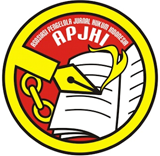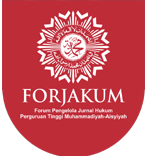Analisis Pengaturan dan Praktik Pemisahan Kekuasaan Sistem Pemerintahan Presidensial Berdasarkan Konstitusi
Abstract
The founding fathers is agreed to embrace a presidential government system. The founding fathers is formulated the vision and mission of the Indonesian nation on the understanding of nationalism. This article would like to answer how the separation of powers in the presidential system based on the 1945 Constitution. The separation of powers arrangements and practices in the parliamentary system has already been applied in Indonesia. Post-independence, the relationship between the President and the House of Representatives in the implementation of the legislative function is not harmonious. Indonesia during the Old Orde was a phase of liberal democracy, then re-enacted Pancasila democracy. Based on its development, political instability helped determine the weaknesses in the implementation of separation of powers in Indonesia.
Keywords
Full Text:
PDFReferences
Abdul Mukthie Fajar, 2006, Hukum Konstitusi dan Mahkamah Konstitusi, cet.1, Jakarta, Konstitusi Press.
Albert, Richard, 2009, “The Fusion Of Presidentialism And Parliamentarism”, American Journal of Comparative Law, Vol. 21 No. 3.
Burhanuddin Muhtadi, 2009, Sistem Presidensial Setengah Hati, Jakarta, Sekretariat Negara Republik Indonesia.
Ellydar Chaidir, 2008, Sistem Pemerintahan Negara Republik Indonesia, Pasca Perubahan UUD 1945, cet.1, Yogyakarta, Total Media.
Elgie, Robert, 2009, "Duverger, Semi-presidensialisme”, West Eropa Politics, Volume 32, Edisi 2.
Fifiana Wisnaeni, 2013, “Rekonstruksi Hukum Pemilihan Umum Anggota Dewan Perwakilan Rakyat sebagai Upaya Pemenuhan Hak Asasi Warga Negara”, Disertasi, Semarang: Program Doktor Fakultas Hukum Universitas Diponegoro.
King, Blair Andrew, 2004, “Empowering The Presidency: Interests And Perceptions In Indonesia’s Constitutional Reforms, 1999-2002”, Dissertation, Ohio: the Graduate School of The Ohio State University.
Mahkamah Konstitusi Republik Indonesia, 2010, Naskah Konprehensif Perubahan Undang-Undang Dasar NRI Tahun 1945, dalam Latar Belakang, Proses dan Hasil Pembahasan 1999-2002, Buku IV Jilid 10 edisi revisi, Jakarta, Sekjen dan Kepaniteraan Mahkamah Konstitusi Republik Indonesia.
Majelis Permusyawaratan Rakyat Republik Indonesia, 2000, Ketetapan Majelis Permusyawaratan Rakyat Republik Indonesia No. IX/MPR/2000, Jakarta: Sekretariat Jenderal MPR-RI.
Margarito Kamis, 2004, “Gagasan Negara Hukum Yang Demokratis Di Indonesia Studi Sosio Legal Atas Pembatasan Kekuasaan Presiden Oleh MPR 1999-2002”, Disertasi, Jakarta: Program Doktor Fakultas Hukum Universitas Indonesia.
RM. AB. Kusuma, 2011, Sistem Pemerintahan Pendiri Negara versus Sistem Presidensiel Orde Reformasi, cet.1, Jakarta, Fakultas Hukum Universitas Indonesia.
Saldi Isra, 2010, Pergeseran Fungsi Legislasi: Menguatnya Model Legislasi Parlementer dalam Sistem Presidensial Indonesia, Jakarta, Rajawali Press.
Warwick, 2009, Introduction: The Government Survival Debates, Cambridge, Cambridge University Press.
Zulfan, 2003, “Gagasan Perumusan Syari’at Islam Dalam Konstitusi Indonesia: Studi tentang Perubahan Pasal 29 UUD 1945 pada Sidang Tahunan Majelis Permusyawaratan Rakyat Tahun 1999-2002”, Tesis, Jakarta, Magister Hukum Program Pascasarjana Fakultas Hukum Universitas Indonesia.
DOI: https://doi.org/10.18196/jmh.2018.0102.60-67
Refbacks
- There are currently no refbacks.
Copyright (c) 2018 Zulfan Zulfan
JMH Visitor






















